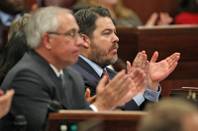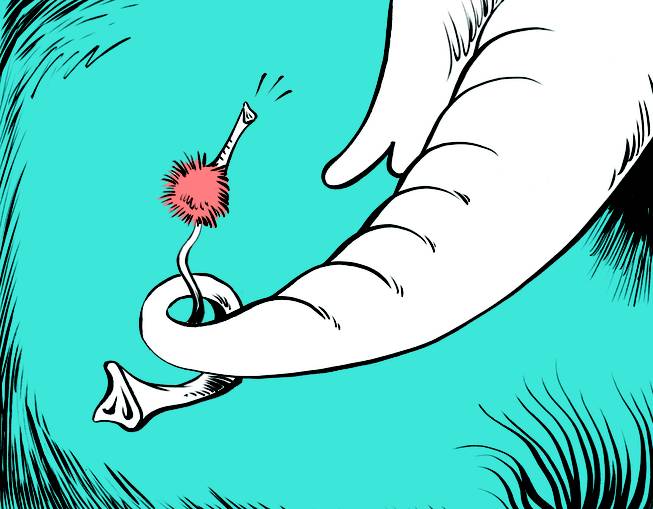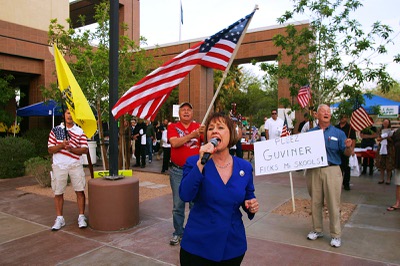Sunday, May 5, 2013 | 2 a.m.
Sun coverage
Freshman Assemblyman Jim Wheeler’s favorite thing to do at the Legislature: Argue with liberals.
From where he hails — the rural ranching town of Gardnerville — there aren’t many of those for the cowboy hat-wearing, retired businessman with a deep, gravely voice to argue with.
“It’s so much fun,” the exuberant lawmaker said from his fourth-floor office at the Legislative Building last week. “Where else can you argue with a liberal every day? You argue with one, you can turn around and, look! There’s another!”
This session, Wheeler appears to be one of a dwindling breed in the Nevada Legislature — an unabashed, no-taxes, no-gun-control, no-immigration-reform conservative.
Some Democrats — even some Republicans — are still smarting from the days when a cadre of staunchly anti-tax Republicans — even though they were the minority — had numbers large enough to both derail tax policy by adamantly saying “No!” and push agendas to rein in state spending.
In 2003, for example, a band of 16 Assembly Republicans forced two special sessions, a Nevada Supreme Court fight and almost delayed school openings by digging in their feet against a tax increase.
Today, however, signing the Taxpayer Protection Pledge seems to be a ticket to the sidelines for Republicans interested in participating in the budget debate. The number of pledge signers has declined for the past three sessions.
In 2009, the number of lawmakers who signed the pledge never to raise taxes was 11. In 2011, nine had signed it. This year, six have signed it.
Well, technically, seven have signed it.

Assembly Minority Leader Pat Hickey, R-Reno, left, and Senate Minority Leader Micheal Roberson, R-Las Vegas, listen as Nevada Gov. Brian Sandoval delivers the State of the State address at the Legislature in Carson City on Wednesday, Jan. 16, 2013.
But Senate Minority Leader Michael Roberson, R-Henderson, has since renounced the pledge he signed, saying he’s open to considering tax increases and has even proposed one of his own to put before voters next year.
Indeed, the majority of the Republican caucus in the Senate seems to have turned on its more ideologically conservative counterparts, proposing an initiative to double the tax on the mining industry to fund education. Six Senate Republicans support the measure; four do not.
Even the Tea Party seems to have gone into hibernation.
Wheeler admits he’s in the minority in Carson City. He laments what he sees as the leftward shift of the Republican Party in response to recent trouncing at the polls.
“Republicans seem to be trying to come to the middle,” Wheeler said. “But people won’t vote for that. People don’t vote for a party that changes its ways. People vote the person who sticks to what they say.
“Now, we have to cater to minorities? Cater to gay marriage? Because the world is changing? That’s true. But American values are not changing.”
Wheeler contends the Assembly Republican caucus is strongly conservative, and an incubator for a new generation of fiscal crusaders. The group has borne that out in some ways. They’ve opposed Roberson’s mining tax proposal, for instance.
Four in their ranks have signed the pledge: Wheeler, John Hambrick, Michele Fiore and Pete Livermore. Assemblyman Ira Hansen, although he hasn't signed the pledge, is often plowing ahead on conservative policy.
But Assembly Minority Leader Pat Hickey, who has endorsed a revenue-neutral approach to reforming Nevada’s tax structure, said Republicans these days try to take a more nuanced approach to fiscal policy.
“The low-taxes, small-government element is part of the fabric of any Republican caucus,” Hickey said. “But what we’ve seen is a maturity.
“One of the frustrations of Republicans like myself, who are not ideologically committed to say no to everything, is that all too frequently the other side of the argument about savings is not taken seriously.”
Some look back at the days when a devout anti-taxer such as former state Sen. Bob Beers won enough credibility and clout to be named to the Finance Committee by a Republican leader who didn’t share his black-and-white ideology as the glory days.
In 2003, Beers was a member of the so-called “Mean 16” in the Assembly who held fast through two special sessions to block a tax increase before one broke ranks and found a compromise he could vote for.
Beers also went on to pursue aggressive spending control initiatives.
“Bob Beers and Lynn Hettrick were forces to be dealt with,” Wheeler said. “They stuck to their guns. They didn’t waffle. They said, ‘No, we’re not gonna do it.’”
Others, however, look back and cringe at the days when that element, which included former Assemblywoman and failed U.S. Senate candidate Sharron Angle, held sway over the Legislature.
“A true conservative isn’t just no, no, no,” said former Sen. Warren Hardy, a Republican who worked to help broker a tax compromise in 2003 and was frustrated by the GOP bloc in the Assembly who adamantly refused to vote for any increase.
“Taxes aren’t the first place you go, but the public wants problem solvers.”
The dwindling number of tax pledge-signing Republicans in Carson City doesn’t necessarily mean Democrats have free rein to raise taxes. A tax increase needs a two-thirds vote of legislators, and while Republican leaders have voiced support for potential “revenue-neutral” tax reform, they aren’t all that keen on flat-out tax increases.
Also, Gov. Brian Sandoval has vowed to veto any tax increase outside of allowing the “temporary” tax increases passed in 2009 to continue.
Others dispute that the Legislature lacks a vocal champion of fiscal conservatism.
Beers, now a Las Vegas city councilman, said the context is different now.
“An extreme expansion of taxes and government services was implemented during that decade,” Beers said of the $833 million tax increase passed in 2003. “If the liberal agenda is so extreme, it causes people to step out of their comfort shell and say, ‘Wait a minute, have you looked at this?’
“Now, without someone appearing to be in a position to advance an irresponsible fiscal agenda, the normal fiscal conservative has no reason to stand up and object.”
Although Democrats have called for some kind of a general business tax, their efforts to pass one have failed repeatedly.
So while Democrats fall short of a significant tax increase and the clarion call of anti-tax Republicans has been muted, lawmakers have limped along with temporary tax policy and have delayed serious attempts to fix what many studies have found to be a wobbly state tax structure.
For the third legislative session, lawmakers are considering extending what was supposed to be a temporary tax increase, while trying to make incremental changes to close loopholes.
“We never seem to be able to get to that point of having a serious discussion about revenue-neutral tax reform,” Hardy said. “The limited session and the political process are the enemy of that. It will always be a political football.”



Join the Discussion:
Check this out for a full explanation of our conversion to the LiveFyre commenting system and instructions on how to sign up for an account.
Full comments policy